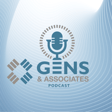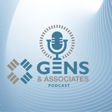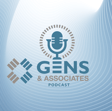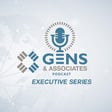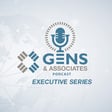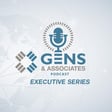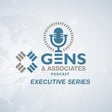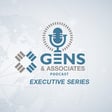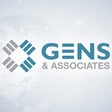Become a Creator today!Start creating today - Share your story with the world!
Start for free
00:00:00
00:00:01

Service Provider Executive Series Episode #7 Brian Williams (KPMG)
In today’s episode, host Steve Gens is joined by Brian Williams (Managing Director at KPMG LLP). Together, they discuss improving operational efficiency and time to market, Innovation in Regulatory and Regulatory R&D function with A.I., and what to expect from the Regulatory practice at KPMG!
If you enjoyed this episode, be sure to follow and subscribe to hear more from industry experts and leadership in the Regulatory space!
Transcript
Introduction and Background
00:00:00
Speaker
Welcome to the Gens & Associates Regulatory Executive Podcast Series. I'm Steve Gens, your host, and today I have the pleasure of speaking with Brian Williams, a partner at KPMG.
00:00:13
Speaker
So ah Brian, a welcome. And I think we met a little bit over 10 years ago on a mutual clients project. I think Greg was working on it too, where we were doing a study of all their local affiliates around the world. And you know certainly since then we've collaborated, our firms have collaborated on you know several you know really, really interesting projects. So look forward to this discussion.
00:00:38
Speaker
today.
Career Journey and KPMG's Focus
00:00:39
Speaker
And for our listeners, maybe a brief introduction of yourself and the KPMG regulatory practice. Yep. Thanks, Steve. And thanks for having me. Yeah. So Brian Williams, I work for KPMG in our life sciences practice. I've been in consulting for over 18 years now, most of which has been focused on serving the regulatory affairs function. Just a little bit of background on me in terms of you know how I sort of landed here. It was somewhat coincidental. I was actually a finance and accounting major in college. I did an internship at Eli Lilly that was in the internal audit function. I learned a lot, loved sort of the fast pace and the travel, but I realized that I didn't necessarily want to be an accountant. I wanted to yeah more proactively help companies versus just doing some of the financial accounting work. So from there I kind of pursued consulting and you know one of my
00:01:33
Speaker
One of my early projects was ah a post merger integration project for a large life sciences company. Just so happened to be in the regulatory affairs function. So that's really where I kind of coincidentally learned a lot about regulatory processes, system data, work structures, things like that. And then, uh, really that was just the start of a long journey where, you know, we've, we've sort of built out our team that provides services in this space.
00:01:58
Speaker
There's been a lot of investment, a lot of transformation over the last decade or so, and it's really been and a fun ride. um About KPMG, a very large professional services company. I think we're over 250,000 employees globally now.
00:02:13
Speaker
you know most widely known as a big four accounting firm, but we also have a significant consulting business. And then within that business, we have a dedicated life sciences advisory practice, and I help lead our team that's focused on serving the regulatory affairs function. In terms of some of the work that
Practical Approaches in Regulatory Projects
00:02:30
Speaker
we do, we help clients with you know many different types of large initiatives around process improvement, work changes, technology implementations, getting ready for upcoming regulations,
00:02:41
Speaker
Our services really cover sort of the full spectrum of transformation all the way from strategy through to implementation. And you know a lot of these projects, it's sort of a given that they require a lot of extra capacity to get the work done outside of people's day jobs. But we really try to you know kind of provide deep domain expertise. So every project that we're doing, we're executing with people that really understand regulatory, understand the function, and are providing that expertise in addition to the extra extra set of hands.
00:03:11
Speaker
Lastly, we do a lot of work in the M and&A space. you know We have large teams that are focused on the financial and tax implications of mergers and acquisitions, but there's all in a regulatory work stream as well. And that's where our team would help support some of those large deals. So great to be here, Steve, and happy to jump into the conversation. Yeah, thanks for that, Brian. I'm i'm sure that's very helpful for our listeners. And I guess maybe summarize, you you guys can do it all no kind of in the ah in the regulatory space. And I would imagine, and maybe we'll start out, is you know kind of your financial background. Because I know we've you know our farms firms did three or four you know kind of projects over the years. And some of it, you know with the majority in the regulatory space, I think more on the
00:04:01
Speaker
biopharmaceutical side, the monetizations and transformations. And certainly I know you guys have been working on the Metex side, you know, with some sizable you know firms as they're starting kind of their modernization, you know, regulatory modernization. um So there's a lot going on um on that. So with your financial background, some of the business cases, because I think just like ourselves, you've seen a lot and some that are ah probably generous, but then there's, you know, kind of the key to have them to be pretty accurate, you know, so they're just not hypothesis-based. I, yeah you know, certainly when we've collaborated, you and your team have just bring that practicality, you know, to a lot of the business cases that I always appreciate, and I know your clients do, too. So maybe we can start there, and it might be interesting to talk both about the biopharmaceutical, and I know recently you've had some, you know, MedTech support with these big
00:04:58
Speaker
monetizations, transformations, whatever you call them, there's been so much change. And maybe the other thing, you know, giving some examples how you and KP and G have supported it, you know, but the other thing too, and I was talking with somebody else,
00:05:12
Speaker
a couple of weeks ago that, and we actually had a project this fall that there was the big, big transformation, because it was the system level, the process level, and the operating model ah for this one regulatory division. They made the big change, and a year later, they kind of stepped back and went into an optimization you know kind of phase and and continuous improvement. So maybe you could talk a little bit about both you know as far as supporting you know that big event-based change. but you know where the a lot of the value comes through is that continuous improvement optimization after the big change. Yeah,
Trends in Regulatory Transformations
00:05:49
Speaker
absolutely. Yeah, so so like you said, you know we we provide sort of a wide range of services across people, process, technology, and data. Data is becoming more and more important every single day.
00:06:00
Speaker
And we also do this for both pharma and med device companies. So med device, we're seeing a lot of transformation activity in that space, whereas you know pharma was sort of on the the leading edge over the last 10 years or so. So overall, you know try to take a really practical approach or you know we're not just trying to enable compliance or you know hit deadlines and a project plan, but really trying to figure out how we can help our clients achieve ah a more sustainable approach. you know There's a really complex global regulatory landscape and it's really hard to be practical and thoughtful about how some of these processes are executed and how to manage the data and all the technology that goes with them. so
00:06:43
Speaker
you know we've We've helped a lot of companies with their you know real transformation programs, inclusive of operating model changes, M and&A, AI automation. you This includes upfront assessments as well as the you know kind of business cases, defining the scope, making sure that you're biting off the right aspects that are going to drive the most value, and then working side by side with our clients on executing those those transformations. um We tend to focus more on sort of the business side of these initiatives. so operating model changes, process changes, org changes. But then we also have a team that is more technical in nature that does hands-on delivery of automation, AI, and data-related initiatives. And like you said, on the the med device side, I mean, that's been a really interesting space over the last couple of years. You know, pharma had their sort of big investment cycle over the last 10 years, I would say. but
00:07:36
Speaker
On the device side, you know a lot of companies are really just starting their journeys or on the early stages of it. So EUMVR was a big wake-up call. I think a lot of companies realized that you know shared drives and spreadsheets were were not going to be sustainable for managing all their information and their submission documentation. um So because of that wake-up call, you know we're seeing a lot more investment on the MedTech side. And also you know more specialized capabilities and solutions that have matured as well.
00:08:06
Speaker
And then ah
Challenges with Combination Products
00:08:07
Speaker
in terms of our experience, the last piece I'll mention is again, M and&A, super important space. Hopefully, you know, some of the deal activity will will will continue to rise over the next couple of years. But what we often see like in post-deal scenarios is this kind of focus on like supply continuity as a concept, which is not just regulatory, but quality supply chain, commercial, all having to work together to make sure that they're in sync in terms of cutting over to a new set of labels or doing read registrations and regulatory plays a key role in that. But more holistically, we're helping our clients make sure that that supply continuity is in place and they're driving the appropriate value for their patients and for the the overall kind of financials of the of the integration. So a lot of different projects.
00:08:54
Speaker
it's been ah It's been a great ride over the last 10 plus years where a lot of investment has been made on the regulatory function and excited to look ahead to some of the AI automation and some of the more innovative things that are coming down the road as well.
00:09:11
Speaker
Yeah, on the AI automation, as you know, Greg and I were just talking this morning, we're finishing up and we'll probably have, it's either 39 or 40 companies on the sponsor or an industry side, 15, 16, the typical suspects on the software provider, but then all these kind of startups doing generative AI, you know targeting medical writing, those types of things. so you know, that is getting, you know, very, very interesting. but But before we kind of dive into that topic, I just want to back up, you know, a little bit. So, you you know, maybe just to summarize, and I completely agree, we we started seeing in 2013 with a research because we had our first RIM study there before RIM was even the term, and we thought it was going to be the decade of regulatory transformation. So it's kind of like
00:10:00
Speaker
thinking of the bell curve, the the bell curve has modernized and you're in an optimization side, but then just the start of the modernization kind of in the med tech. um Do you ever get any clients that, you know, there's so many more companies that are combinational products or even kind of in your and M and&A activity and the M and&A is killing us, Brian, because just as we're trying to get so many more small and very small, you know, companies in the benchmark, and then by the time we do our next cycle, five, seven or 10 of them are bought, you know, by the big ones. So
00:10:34
Speaker
But you know kind of getting back to those combination products, are you seeing more you know kind of blending you know when we look at regulatory and systems and processes? And there's distinct differences. There's a lot similar between the two sides. But differences like the design history file, more of an engineering paradigm. But are you working with any clients or have any perspective you know with these combinational product companies, yeah where they have the complexity of both? Yeah. i mean i think
AI and Automation in Regulatory Work
00:11:04
Speaker
The really cool thing is that that there's so many innovative therapies out there now um and the the products that are in the pipelines have some sort of digital or ah device component with them in terms of delivery or you know companion diagnostics, things like that. so
00:11:20
Speaker
really really sort of taking a legacy pharma pipeline type of approach is is not sustainable anymore. So companies have to think about how do their regulatory teams support these different product types? How do they work with different you know partners who may be providing the device components of of the product? There's a lot of complexity that comes with that, which drives, ah ultimately drives a lot of upside for the patients in terms of innovation. so That affects your org structure, it affects the processes, it affects the technology they're using to capture the registrations and the submissions. And we've seen a lot of activity in supporting multiple clients on kind of thinking through how to transform from the kind of legacy pure pharma model into more of a device-centric or a combination-centric model.
00:12:09
Speaker
Yeah, so it is definitely, definitely interesting times. So I want to kind of hook into, you had mentioned digital, you know, on this, because, say, that the tactical conversation is AI automation, right? But it's under the umbrella of of digital. It's just one expression, you know, kind of above ah digital as we move forward. And I'm getting ready for a, ah you know, presentation, and it's around the, you know, AI automation pulse survey we're doing. and I'm thinking about having an image of one of the fast-moving trades, because this is moving very, very quickly. I mean, you and I have seen a lot of technology cycles, and this this one's pretty incredible. So it'd be good you know to get from your perspective, because why we kind of track the trends, we get to a certain level of detail um you know in our benchmarks, you know some client work with the roadmaps of investments for the next three or four years in AI automation.
00:13:07
Speaker
But your team gets down into the not only the strategy, but down into the working level. With a lot of these things, there's so many proof of concepts going on now. So it'd be interesting, you know, kind of through the lens, your your eyes and your team's eyes, with the clients you work with, you know, where's this going, you know, in the near term, you know, 2526, and actually the longer term, and you You know, any kind of words of wisdom for, um, you know, listeners about how to best prepare, you know, for the adoption of AI and automation in regulatory. Yeah, no, I mean, it's super exciting and like you said, a fast moving train, but now I think the, the most exciting part to me is, is sort of this paradigm shift from.
00:13:52
Speaker
The last decade or so that was, like you said, it was very much about modernization investments, getting onto unified platforms, creating a a sustainable foundation for the technology and the processes. But with a lot of those projects, I mean, it was this heavy upfront investment that helped companies consolidate data, harmonize processes. But a lot of those have kind of struggled to have like a really trackable return on investment. And as we shift now into this sort of era of AI and automation,
00:14:22
Speaker
we can use that foundation that's been set to really drive discrete ah ROI on projects, which is a very different sort of mindset than traditionally you've seen in regulatory. So you're able to do work differently. You're able to take potential costs out of the function by having a very kind of discrete input and output from the AI and the generative AI projects that the teams are working on.
00:14:50
Speaker
and And really a lot of that is driven by the excitement around generative AI, which you know is all about helping people with knowledge work. And that's a fundamental shift from some of the traditional automation and RPA things that we've seen in the past. And to some degree, those you know had a limited impact on regulatory because regulatory work by its nature is very content heavy. It's very project oriented.
00:15:14
Speaker
there aren't a lot of like really linear predictable processes. So now with the the concept of generative AI and the impact that it can have really on knowledge work, which is what a lot of the regulatory work is, there's some really big opportunities in front of us. If you think about sort of the vast amount of data and content that's stored in regulatory platforms, in many cases, those those systems and those processes are helping drive what I'll call transactions in the systems. So they get the job done, they drive compliance, they get the submission out the door, but all that content and data is not necessarily being used for strategic insights to make the team smarter, faster in the work that they're doing. Whereas if you kind of shift into this knowledge work concept,
00:15:59
Speaker
the concept of AI being sort of an augmentation to the team, thinking about them almost as like a ah way to do more audited ways automated ways of doing key tasks and research, almost like we thought about offshoring 10 years ago, where it was like, you know I'm going to hand off tactical work to a different person in a different time zone.
00:16:17
Speaker
You know, you can now think about generative AI as a way of doing more automated tasks and having research sort of served up to you that's pointed and specific and helpful. So, you know, we're seeing a ton of opportunity there. but One you know example would be like a change impact assessment. You know, traditionally you would have a ah change to a product. You would then send out that change to hundreds of different you know countries around the world. They would have to think about the change and whether they need to do a new registration or a notification.
00:16:47
Speaker
You know, think about if you were to go back and look historically at all those analysis that they've done previously in the past. um You know, you can really start to capitalize on all of that knowledge work and synthesize that information, synthesize the requirements, synthesize all your previous assessments and start to build recommendations on how to do those activities faster, smarter, more accurately in the future and save a lot of tactical work that would be required for each of the folks that are sending in the country. so That's just one example. You could apply that to the content generation. You could apply that to HAQs. You could apply that to translations. But that's why it's such an exciting time. It's just thinking about how you can really disrupt this sort of knowledge work that's happening in the in the regulatory space. And I guess the the last point I'll make on this this topic, and it's a really important one, is yeah you mentioned that you' you know there's a lot of proof of concepts going on.
00:17:43
Speaker
ah There's a lot of activity. It's it's really fast moving, but you know it's really important that companies also sort of take a step back and have like a holistic approach to this. It's one thing to do a proof of concept. It's a whole other beast to really implement these solutions, and that's where a lot of times we come in and help um you know thinking about how you drive security, transparency, explainability of these models. You want to make sure if you have a model that you're getting the same answer every time you run it, you don't want two different answers depending on the same set of inputs. There's also a lot of foundational data cleanup that's required. You want to make sure the right people have the right access. um You know, CSV, doing GXB validation on these solutions is is often challenging because they're somewhat unprecedented. So,
00:18:29
Speaker
There's a lot of factors to consider and really kind of taking a holistic approach is is super critical. um And you know the last piece obviously is sort of the human element of all this. How do you roll these things out in a way where people don't feel threatened and they're also, you know you're sort of proving the value as you go. You're building trust in these technologies. You're showing people that they're a net benefit to the work that they're doing.
00:18:53
Speaker
And that's
Data-Centric Models and AI Evolution
00:18:54
Speaker
the kind of change management organizational elements that we also tend to focus on with our clients. Yeah, so so a lot to digest there, Brian, but I think that the kind of weigh in for listeners, a lot of things you said, but like two two points here. So you know if we go back just five or seven years, because you talked about this kind of shift, and I completely agree with you, um I'm just going to use maybe different words to express the same thing that you're talking about that.
00:19:25
Speaker
The center of the universe were systems five to seven years ago. The center of the universe is data. Because the thing that's you know interesting, and we're talking more about it you know all you know with some of the presentations coming up, you know there's such focus on the generative AI, just AI as an umbrella, you know automation. But there's just the same amount of investment going on. And there's many different names. I think the latest is Data Fabrics.
00:19:53
Speaker
you know, the data warehouse data lakes. And that's cross you've cross functionally, you know, it's not only regulatory data, we're pulling, you know, the QMS data, the safety data, some of the data from clinical, it's a different type of, you know, kind of consumption, because in the old days, so you know, we're really focused on system connectivity, workflows and bots. Now it's about the data fabric.
00:20:16
Speaker
And then leveraging of that. So I think from that system centered universe to it's the data center independent, because you and I is actually it's interesting, it's the power of words, we both use like for the systems, it's more the transactional systems, yeah going more to the background. And then the other thing I think it's really important for our listeners, and I might kind of push it with some fun words on this because it brings me back into one of the working sessions that our teams did ah together with a client, you know, in the not too distant past where the struggle of the context for their modernization, like, you know, how do we kind of serve this up for senior leadership?
00:21:00
Speaker
you know Is it something where we're going to have these massive business gains? And I've always used the word more of that transformation. I've always used the word modernization. Because you know each function, you modernize it every 10 or 15 years. It's a cycle, right? Yeah. And so that other one where we can get some probably outrageous claims, and I could probably list out a few clients, and you probably know them too, that overshot the business case, right?
00:21:26
Speaker
And I recall in the meeting with you and the team, and I think there was like a pyramid or something, that foundation that were, you know, were actually re-platforming the foundation. So as you've really nicely articulated some of these add-ons with generative AI and data fabrics, that's where you're going to get the big, you know, kind of big return. But you need a fundamentally new foundation based on data, just not a bunch of transactional systems. So I think that's a really, really important you know concept you know on that. and and Certainly there are some things Greg and I are almost done with that study about the sentiment and it was nice to see because I think it's changed over the last 18 months that you know AI is going to replace a lot of jobs versus AI is ah is an assistant.
00:22:11
Speaker
yeah So we're seeing that sentiment actually kind of shifting. And I think it's a lot, you know, I'm big on the Gartner hype curve, a lot of inflated expectations now with these proof of concepts, we're getting that practical reality of what's going to work. Not, you know, some of the accuracy with the generative AI, you know, we're seeing pivot or tipping points, you know, more in the 2026 27, because although technically it might work, the accuracy needs to be up and and confident. And we have one of our Software providers in the survey, they had a little addendum to the response and saying they had a customer, and this just came in yesterday, had a customer saying, we can't use your software if it has AI on it because we're not comfortable with it yet.
00:22:55
Speaker
So we're going to learn a lot from that. Yeah, I really liked how you talked about the business cases. And it's just you know kind of working with the you know working with the data that's important. and And we could talk about this for a while. But anyway, um that's Chef Gears here. And there are so much going on. Like you said, it's an exciting time, exciting future. And you get to work with so many different types of companies that must be really, really satisfying.
00:23:23
Speaker
So, from the regulatory practice at KPMG, what should we expect in the coming years? Yeah, no. Like you said, yes. Super exciting time. I think a lot of evolution and and you know focus on AI automation. And then, like like I mentioned, a lot of you know big focus and investment happening on the MedTech side, which is which is pretty cool.
00:23:45
Speaker
um you know For us, you knowre we're we're always making sure that we're sort of listening to our clients, monitoring the environment, using things like you're getting surveys to ah to make sure that we're we're you know we have a pulse on on what clients are looking for because it does change and we want to make sure we sort of listen and adapt to meet our client's needs. um you know That's a combination of hands-on development and working with our technical teams on AI automation projects, but then also,
00:24:13
Speaker
helping with you know broader transformation and some of those foundational systems, particularly in the med device sector. So um yeah super super super exciting aspects of that work. And then you know we're also really keeping an eye on some of the external factors. um you know We've talked a lot about sort of internal optimization using AI automation, but there's still a lot of possibilities out there in terms of how companies fundamentally work differently with health authorities through a cumulus, prison, things like that. We're also reliance, you know, really trying to make the exchange of information more real time or seamless. You know, that's something that we want to make sure we're supporting and enabling over the next, you know, five to 10 years. And on the device side, there's a big, a big effort around Unimad right now in Europe, which is sort of similar to IDMP where you have to
00:25:09
Speaker
submit a lot of different product information. the The timelines have changed several times, but we think that there's ah sort of a tipping point that's going to happen in 2026 that a lot of companies are now getting ready for. so At a macro level, there's a lot to keep an eye on. There's a lot of things happening. And most importantly, just you know thinking about the patient and like you said, combination products, precision medicine, things that are really driving changes in how companies have to manage their data and manage their submissions. Those are all aspects that are there are really you know big opportunities to to drive further value and and and really help the the industry as a whole.
00:25:47
Speaker
so A lot to look forward to, and we we hope we're able to kind of contribute to those those innovations as much as we can. Yeah, absolutely. I have a lot of respect for you and your team, and you know that's why why we collaborate on projects. It just feels like you know kind of a seamless team. We all have our different strengths you know that we kind of bring in and contribute with our client work. and I never thought about it this way, Brian, to this conversation. I scribbled a note here because I was going to say, and I'll say it, it's early days you know with the AI you know umbrella, generative AI and all that, and I just kind of had a flashback. and I'm really going to show my age here.
00:26:28
Speaker
is, you know, back in just when I joined Johnson & Johnson, I had left Waterford Crystal when they bought Wedgewood China and redid, you know, all the systems and processes and joined Janssen there at J and&J. And, you know, on the business side, they're running AS400s and the Research Foundation, there was, you know, Vax's.
00:26:49
Speaker
And these things called PCs, and then the laptops were coming out. I was like, what the heck are we going to do with them? There's ethernet, token ring, which I don't think exist anymore. But those were early days, and we knew it was going to be very impactful and get more personalized versus the big main system or mainframe, or in this case, AS400 and Max. And I just really feel like it's kind of the same thing with the AI, generative AI.
00:27:19
Speaker
that it's going to be a wild, um you know, five, seven years, and even the advancements in science, you know, the sector that's so critical to worldwide health that we support. You know, it's really amazing time. So I'm really excited for you and your team and just, you know, kind of keep up the great work. um So
Closing Remarks and Contact Information
00:27:38
Speaker
with that said, sometimes on these podcasts, people want to get ahold of you. So what's the the best way to get ahold of you or your team at KPMG?
00:27:48
Speaker
Yeah, you know, feel free to reach out to me on LinkedIn or you can email me directly. It's bewilliams at kpmg dot.com. And Steve, really appreciate you having us on and great conversation.
00:28:00
Speaker
Yeah. And likewise for our listeners, you you know, I'm all over LinkedIn. Unfortunately, I have ah an easy name, you know, a unique name, I should say. ah You can find us or the contact page off our website. So so Brian, we'll see you at the RSI-DM show. I'm sure we'll have this podcast launched, you know, prior to that. And always enjoy the collaboration and exchanging ideas. So thank you so much. Yep. Thanks so much, Steve.
